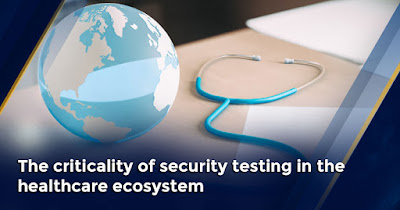The healthcare ecosystem’s dependence on digital technologies to deliver better services to patients and other stakeholders has made it vulnerable to security threats. If statistics are to be believed then healthcare companies across the world are going to cough up a whopping $6 trillion in damages due to security breaches in 2020 (Source: PhoenixNAP.) Modern-day healthcare applications store sensitive patients’ data, which has often led to medical identity theft necessitating the need for rigorous software application security testing. The critical patients’ data may include identity details, payment information, bank account details, history of morbidity, and insurance details, among others. The breach of any of this information can be lethal and devastating, both for the patients and the healthcare facility.
Why is the healthcare security system important?
Cybercriminals are targeting critical patient information to steal identities using methods or tools like phishing, malware, or ransomware. To pre-empt such attacks a robust application security testing strategy needs to be put in place with the following guidelines.
- Top-most priority to be given to ensure security for the vital facets
- The application security testing methodology should remodel the framework for data security, verification, audit logging, and many more
- The other aspects of security testing would include business logic testing, data validation testing, session management testing, DOS testing, Ajax testing, configuration management testing, and OWASP testing to check for vulnerabilities such as SQL injection and XSS.
What are the types of healthcare security testing?
Security testing covers a range of tests to verify and validate the robustness of the healthcare application and its ability to fend off various security threats.
Penetration testing: In this type of testing, ethical hackers try to gain entry into the healthcare application by exploiting its vulnerabilities. The process performed manually or using automated testing, gathers information about the application in terms of the possible entry points. Thereafter, the hacker attempts to break into the application and verifies its level of system protection.
Application-level testing: Also known as app-level testing, the technique ensures the software application doesn’t execute any malicious actions. Here, specific security-related scenarios are validated by conducting functional testing.
DDoS testing: In this type of interactive application security testing, simulated DDoS (Distributed Denial of Service) attacks are conducted with real traffic to understand the level of protection offered by the application to thwart DDoS attacks.
Security code review: It mitigates potential security vulnerabilities in the software code early on and prevents costly and time-consuming fixes later. It serves as a final review to check the application’s safety before launch.
How does software application security testing benefit the healthcare domain
Security testing for the healthcare domain gives insight into the robustness of the healthcare application and its ability to face cyber threats. The benefits of employing software application security testing include:
Protecting PHI: This type of testing Identifies and fixes all vulnerabilities associated with Protected Health Information (PHI) and checks if PHI complies with the HIPAA standards.
Data storage validation: It checks if the data storage mechanism, in encrypted or plain-text form, is safe and secure. Besides, it analyses the security solution, encryption methods, and data management techniques and helps to detect any security issues with the application’s database.
Data transmission validation: Software applications transmit data across cloud, mobile devices, and email, which should be properly encrypted to prevent any unauthorized access at any stage.
Identity validation: Detects vulnerable access points that could be exploited by hackers, especially the areas covering identity management. The software application security testing helps to mitigate any breach of patient privacy and strengthen the mechanism for identity management.
Risk assessment before deployment: Once the application with security-related vulnerabilities is deployed, it may cause havoc in the form of security breaches. The application security testing services offer the opportunity to identify and fix all security-related vulnerabilities in the application. This ensures the application is bereft of any security issue and protects the customer from carrying out any type of financial transaction.
Builds trust and confidence: Security testing ensures the application is compliant with the HIPAA standard. This helps to build the trust of your clients in the application and boost its brand equity.
Conclusion
The cybersecurity dimension is expanding at a phenomenal rate coupled with growing incidences of security breaches. To restore customer confidence and prevent such incidences, healthcare security testing should be conducted rigorously.

No comments:
Post a Comment